When it's time to pack your bags
- Published

The room was crowded, the atmosphere intense, the focus complete.
The décor was minimal, with rough, half-finished plaster on the walls. The toilers, the scribes, appeared not to notice.
Welcome to Sherpa den, the basic accommodation in an Edinburgh office suite occupied for weeks by the civil servants, Scottish and UK, who worked on the Smith Commission.
One desk deals with submissions from the public - all 18,381 of them.
Another drafts papers for Lord Smith and the political nominees, turning ideas into crafted prose. Another covers negotiations, principally involving UK and Scottish interests.
Detail, scrutiny, debate, discussion, bargaining, anger, leavening humour. But, as ever, the outcome is launched forth into the febrile soup that is the contest for public opinion.
And, as ever, there is contention over the implications of what has been agreed - even with such intense focus and scrutiny.
For example, there is a statistical dispute as to whether the plan leaves Scotland raising more than half devolved expenditure.
Labour switched tack and set aside its concerns about the full devolution of income tax bands and rates to Scotland.
In essence, Smith has adopted the Scottish Conservative plan in that area.

Tactically, Labour's aim now is to insist that the Vow has been more than met, that the deal is big - and to do so by definitively side-lining its past concerns.
The SNP strategy was to seek to maximise the gain from Smith - while simultaneously preparing to declare that the ultimate package is insufficient.
This is the tactical mirror of the approach adopted by the parties supporting the Union which is to argue that true Home Rule has been attained.
Both sides are, entirely understandably, seeking to place their own gloss upon the outcome.
And the other parties? The Greens seemed notably discomfited if one is to judge from the comments made by Maggie Chapman at the report launch.
She talked of her fellow Smith nominees "collaborating" to deny the people of Scotland their authentic entitlement.
Her comments, it seems, were aimed in particular at suggestions that the welfare package within Smith was reined in at a very late stage.
The Liberal Democrats fulfil a dual role: vaunting the agreement in Scotland while preparing to work on the draft clauses for an implementation bill due to be published by the UK government in January.
The Conservatives? Again, a multi-faceted response.
In Scotland, they talk up the contribution they believe their own Strathclyde Report made to the final outcome.
They talk of politics returning to debates over tax and spending, rather than the constitution.

Intriguingly, the response at Westminster is much more constitutional.
The prime minister draws attention to the demand for English Votes on English Laws (EVEL) - even although there is no reference to that in Smith.
He says it is an issue contingent upon the development of the Smith ideas.
That has led to contention over whether there would be a move to prevent MPs from Scotland voting upon income tax matters at Westminster - on the basis that such decisions affecting Scotland are devolved to Holyrood.
Opponents of the Tories are seizing upon comments made in a Downing Street briefing to the effect that EVEL applies to financial issues.
However, other senior Downing Street sources insist that the prime minister accepts the fundamental Smith finding - that MPs from Scotland should continue to vote on the budget because elements of income tax are shared between the two parliaments.

More, I feel certain, to follow on this. It would appear, therefore, that the debate over Smith will follow two clear but interconnecting channels.
At Westminster, there will be a debate over implementation and over EVEL.
It is in the interests of the PM to talk up the latter - to unsettle Labour and counter UKIP. It is in the interests of Labour to make this a longer term topic, certainly post election.
At Holyrood and in Scotland, the debate will be over whether the Smith report is a boon or a betrayal.
That will be a factor - a significant factor - in the Scottish facets of the UK General election in May.
In the Smith Commission's temporary quarters, meanwhile, the Sherpas quietly pack their bags and depart.